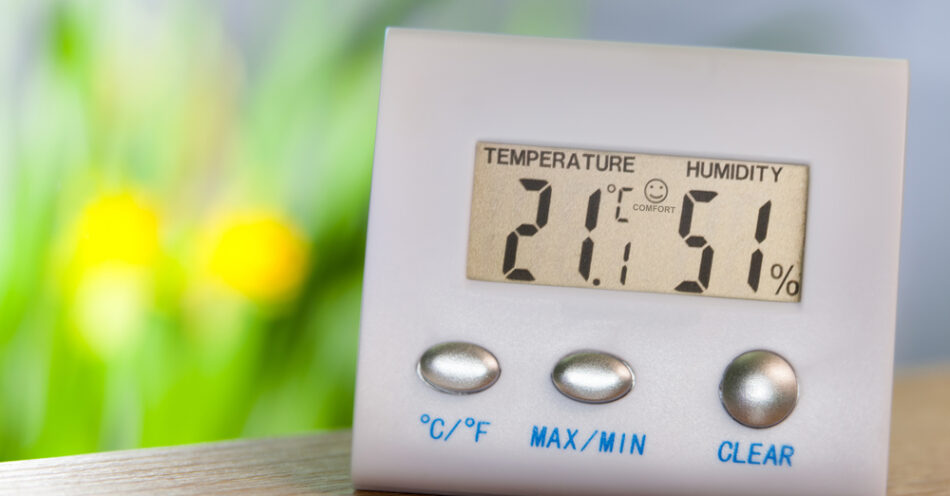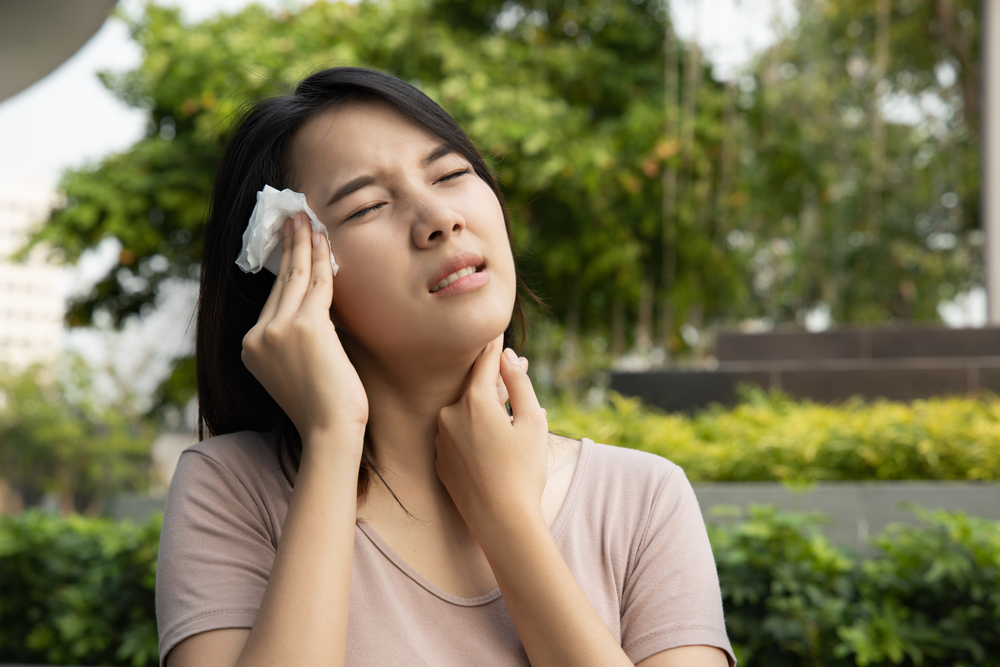
If you’ve spent any time researching different types of cooling systems, you’ve probably heard that evaporative coolers are no good in humidity. You might have even heard that evaporative cooling will turn your home or office into a subtropical environment!
Like all cooling solutions, evaporative coolers have their pros and cons, and one of the major drawbacks is their relationship with humidity.
But are evaporative coolers really as bad as the detractors say, and should you avoid buying an evap cooler?
Here’s what you need to know about evaporative cooling and humidity.
Whether you know it or not, you’ve experienced the power of evaporative cooling in action.
Evaporative cooling is what happens when you get out of the swimming pool or shower and suddenly feel cold.
It’s also what happens when you open the window in a hot car and feel the air cool your sweaty face.
Essentially, evaporative cooling is the natural reaction between the air and moisture. The air reacts with the sweat on your face or the water from the swimming pool or the shower. That moisture evaporates and is absorbed by the air, resulting in a cool breeze.
When you translate that to an evap cooling system, it looks like this:
This process can work like a dream under the right conditions, but evaporative cooling will also increase the humidity levels.
Humidity is a measure of the overall water vapour in the air, and because evap coolers absorb water to cool the air, there is inevitably more water in the air after an evaporative cooler has been used.
Depending on outdoor conditions, a correctly installed evaporative system may increase indoor humidity by up to 5 per cent. This change generally won’t be noticed and also won’t be enough to make anyone more uncomfortable.
However, if the moisture-laden air coming from your cooler has no way to escape, the moisture levels in your home can increase to unsustainable and uncomfortable levels. In highly humid environments, using your evap cooling could even cause damp and mould to develop. Evaporative systems are sometimes called swamp coolers because they use water-soaked cooler pads, but a system that’s being used incorrectly can also cause your property to feel like a muggy swap or steamy, subtropical setting!
You can prevent high levels of indoor humidity by opening doors and/or windows during use or installing an alternative ventilation solution.
Evaporative coolers are open systems, so leaving the doors and windows open serves two purposes:
1. It allows the moisture-laden air to escape, ensuring humidity levels never rise more than a few per cent; and
2. It allows the warm air that was originally in your home to escape and be replaced with cooled air!
Properly ventilating your cooler with open windows and doors will also prevent mould growth and avoid the discomfort that comes with the “swamp effect”. It’s just like when you turn on the extractor fan in the bathroom to prevent steam from settling in and causing mould problems!
So, essentially, if everything is working properly, the increase in humidity should not be an issue you need to worry about.
It’s also worth mentioning that increasing humidity levels can actually be beneficial for indoor environments. If you’re experiencing hot, dry weather, bringing humidity levels up to 40% – 60% can:
We’ve addressed how evaporative systems add humidity to the air, but what happens if you already live in a humid climate or you’re experiencing an especially humid day?
It makes sense that evaporative systems would work best in dry climates because there is very little moisture in the air to start with. This means more water can be absorbed via the cooler pads and the indoor air can reach a lower overall temperature.
In humid regions, there is more moisture in the air to start with, meaning less can be absorbed through the cooler pads, resulting in a cooling effect that is less noticeable. Adding to the indoor humidity levels can also increase a feeling of stickiness and discomfort if it is already a humid day.
So, in a nutshell, your evaporative cooler will be less effective in more humid conditions.
For a more technical explanation, we simply need to look at the concepts of wet bulb temperature and dry bulb temperature.
Wet bulb temperature is the temperature that a thermometer would measure when covered in a wet cloth. Dry bulb temperature is the normal air temperature measured by an uncovered thermometer (ambient temperature).
When the relative humidity is at 100 per cent, the wet bulb and dry bulb temperatures would be the same. In other words, the air cannot absorb any more moisture at its current temperature, meaning evap cooling cannot work.
The lower the wet bulb temperature is compared to the dry bulb temperature, the more effective evap cooling will be.

When humans get hot, we sweat to cool ourselves down. But sweating only works because the sweat is evaporated by the air, causing us to feel cooler.
In high-humidity conditions, it takes far longer for sweat to evaporate from our bodies because there is already so much moisture in the air. It’s just like when humid air can’t absorb any water from your cooling system’s pads!
The slower evaporation rate and increased sweat levels not only prevent you from getting cool – it can actually cause you to heat up further. Your body will also continue to sweat in an attempt to cool you down, which could lead to dehydration and heat stroke.
High humidity can also cause fatigue, cramping, fainting, and other symptoms of hyperthermia.
So, now you know:
With all that in mind, why should you choose evaporative cooling?
The truth is, in cities like Melbourne, evaporative units are incredibly effective because of the hot, dry conditions we experience throughout most of the summer. The same applies to the rest of Victoria, as well as Tasmania, SA, and parts of Western Australia.
Compared to other air conditioners, evaporated coolers are cheaper to run and offer more natural cooling that is better for the planet. Instead of using environmentally harmful refrigerants, these systems just use water. Evaporative units provide greater energy efficiency levels, lower energy bills, and less energy consumption.
Many people prefer the breeze produced by an evaporative air cooler because these systems constantly cycle fresh air into the home. In comparison, standard air conditioners constantly absorb and cool the same air. While the evaporation of water may increase your water bills, you can still expect lower running costs overall.
Evap cooling systems are often better in larger spaces and they can still work quite well between approximately 40-60% humidity. Above these levels, you can still run the fan on your system without running the cooling function. Even in humid conditions, increased fan speed will create air movement that makes you feel cooler. It’s not perfect, but it’s still a type of cooling similar to a ceiling fan.
If you want all these cooling benefits, enquire with our team about installing evaporative cooling in Templestowe, Box Hill, or the surrounds!
If you don’t live in a dry climate or you’re particularly sensitive to humidity, you should choose refrigerated air conditioning.
A refrigerated air conditioning system will provide precise and powerful cooling regardless of outdoor conditions. Perfect whether you live in an arid climate or a highly humid area, evaporative cooling will help you maintain a comfortable level of cooling and humidity all year around.
However, these systems are less energy efficient and environmentally friendly than evap cooling systems.
If you live in Melbourne, chances are an evaporative system will be great for you. It will offer an efficient, affordable, and natural cooling solution that’s perfect for Melbourne’s mostly dry climate. And no – it won’t turn your home into a Townsville summer or create mould problems if it’s installed, used, and cared for properly.
As the masters of heating and cooling, Australian Climate Systems can assist you with evaporative cooling in Melbourne, from installation to cooler services to evaporative cooling repair.
We install and service all the major brands, so whether you need a Brivis evaporative cooling service or you’re considering installing Bonaire evaporative cooling, we have you covered.
And if you prefer ducted refrigerated cooling, you want to add-on air conditioning to your ducted heating, or you only have room for a split system, we can help you with that too!